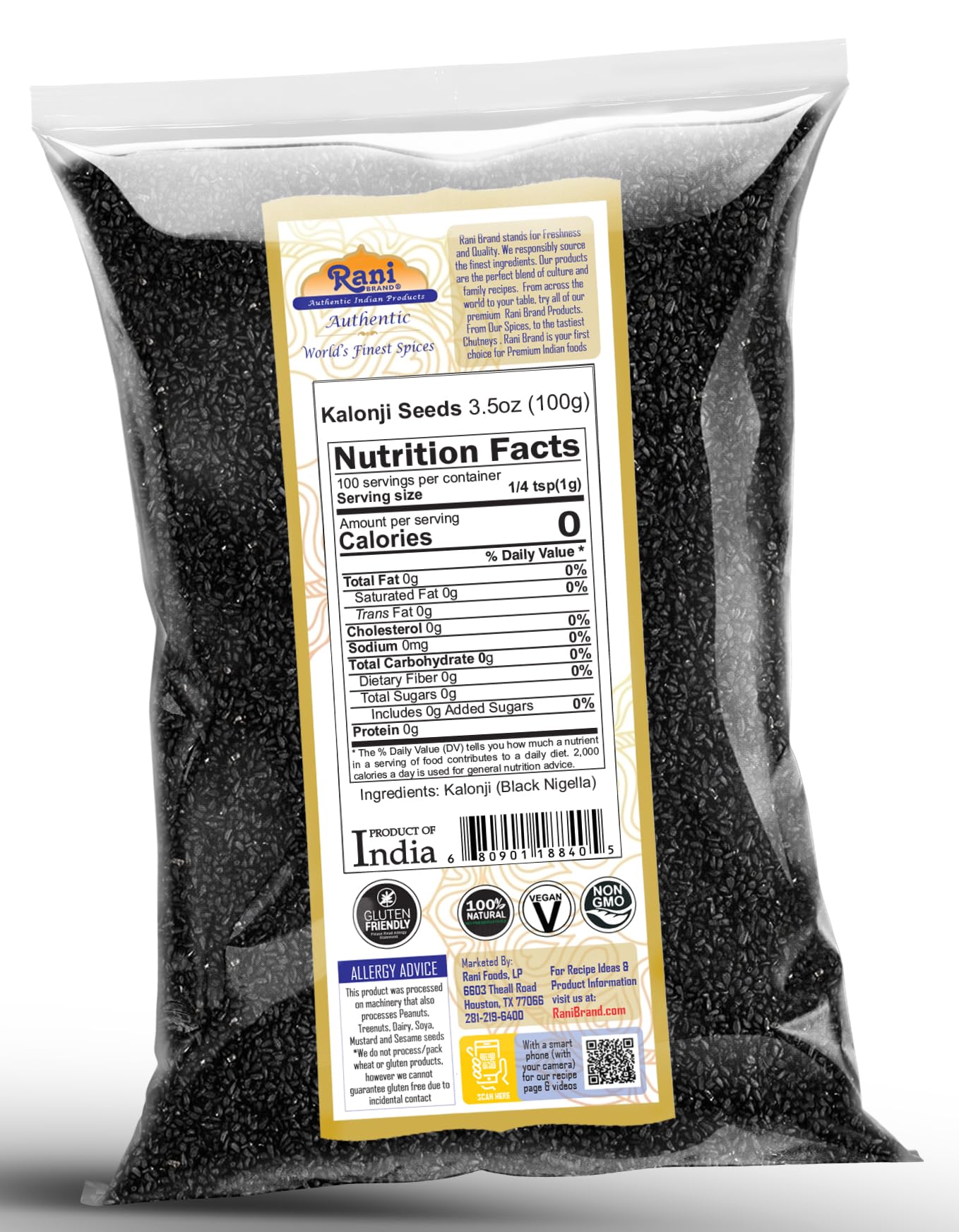You will not be allowed to compare more than 4 products at a time
View compareProduct Description
Kalonji (sometimes spelled Kaloonji or Kalongi),better known as Nigella Seeds (and/or Onion Seeds)....A Little History!
Indigenous to Western Asia, Southern Europe and the Middle East, nigell is most widely cultivated in India. Often refereed to as onion seeds, kalongi is both nutty and slightly bitter in flavor. The whole seeds are used in pulses, vegetables, chutneys and naan breads, often dry roasted before being added to a dish.
Have not Cooked with it before? RECIPE:
Tomato Curry Cook time: 20 minutes Prep time: 10 minutes
Serving size: 4 Heat level: Medium
14oz can tomatoes
1 tsp chopped ginger
2 cloves garlic chopped
1 tsp. Rani Chili Powder
1 tsp. salt
1 tsp. Rani Coriander powder
½ tsp Rani Cumin Powder
4 tbsp. vegetable or olive oil
½ tsp. Rani Kalongi (onion) seeds
½ tsp. Rani Mustard Seeds
½ tsp. Rani Fenugreek seeds
3 dried red chillies
2 tbsp. fresh lemon juice
3 hard boiled eggs
Method:
In a large mixing bowel add tomatoes, ginger, garlic, chili powder, salt coriander, cumin and blend. In sauce pan heat oil and add kalongi, mustard, fenugreek seeds, stir fry for 1 minute. Add tomato mixture to sauté pan and stir fry for about 3 minutes and reduce heat, cover and cook for 7-10min. Stir frequently. Remove from heat. Cut hard boiled eggs into quarters. Add eggs and lemon juice to sauce. Garnish with cilantro if desired.
Indigenous to Western Asia, Southern Europe and the Middle East, nigell is most widely cultivated in India. Often refereed to as onion seeds, kalongi is both nutty and slightly bitter in flavor. The whole seeds are used in pulses, vegetables, chutneys and naan breads, often dry roasted before being added to a dish.
Have not Cooked with it before? RECIPE:
Tomato Curry Cook time: 20 minutes Prep time: 10 minutes
Serving size: 4 Heat level: Medium
14oz can tomatoes
1 tsp chopped ginger
2 cloves garlic chopped
1 tsp. Rani Chili Powder
1 tsp. salt
1 tsp. Rani Coriander powder
½ tsp Rani Cumin Powder
4 tbsp. vegetable or olive oil
½ tsp. Rani Kalongi (onion) seeds
½ tsp. Rani Mustard Seeds
½ tsp. Rani Fenugreek seeds
3 dried red chillies
2 tbsp. fresh lemon juice
3 hard boiled eggs
Method:
In a large mixing bowel add tomatoes, ginger, garlic, chili powder, salt coriander, cumin and blend. In sauce pan heat oil and add kalongi, mustard, fenugreek seeds, stir fry for 1 minute. Add tomato mixture to sauté pan and stir fry for about 3 minutes and reduce heat, cover and cook for 7-10min. Stir frequently. Remove from heat. Cut hard boiled eggs into quarters. Add eggs and lemon juice to sauce. Garnish with cilantro if desired.
Frequently Asked Questions
- Q: What are the health benefits of Rani Kalonji (Nigella Sativa) seeds? A: Rani Kalonji seeds, also known as Nigella Sativa, are known for their numerous health benefits. They are rich in antioxidants, vitamins, and minerals, which can help support immune function, improve digestion, and promote healthy skin. Additionally, they may aid in reducing inflammation and have been traditionally used for respiratory issues.
- Q: How can I use Kalonji seeds in my cooking? A: Kalonji seeds can be used in various dishes to enhance flavor. They are often added to curries, lentils, and vegetable dishes. You can also dry roast them lightly to enhance their nutty flavor before incorporating them into your recipes. A popular use is in naan bread and chutneys.
- Q: Are Rani Kalonji seeds gluten-free and suitable for vegans? A: Yes, Rani Kalonji seeds are gluten-friendly and suitable for vegans. They contain no animal products or gluten, making them an excellent choice for those with dietary restrictions.
- Q: What is the best way to store Kalonji seeds to maintain freshness? A: To maintain the freshness of Rani Kalonji seeds, store them in a cool, dry place away from direct sunlight. Keeping them in an airtight container can also help preserve their flavor and aroma for a longer period.
- Q: Where do Rani Kalonji seeds come from? A: Rani Kalonji seeds are sourced from India, where they are widely cultivated. The seeds are known for their high quality and authenticity, making them a popular choice among culinary enthusiasts and health-conscious consumers.










